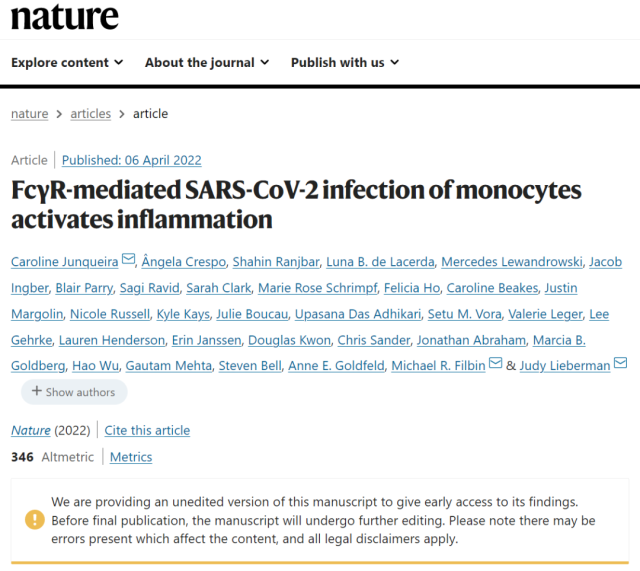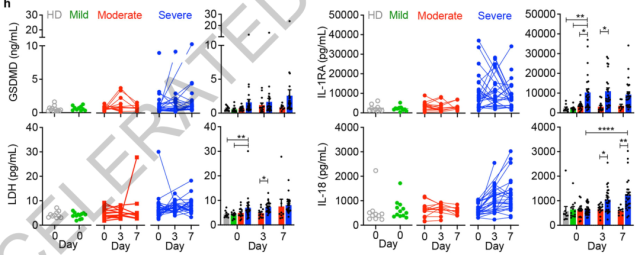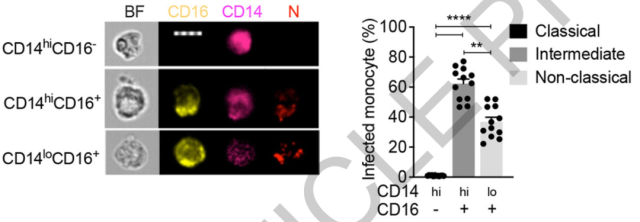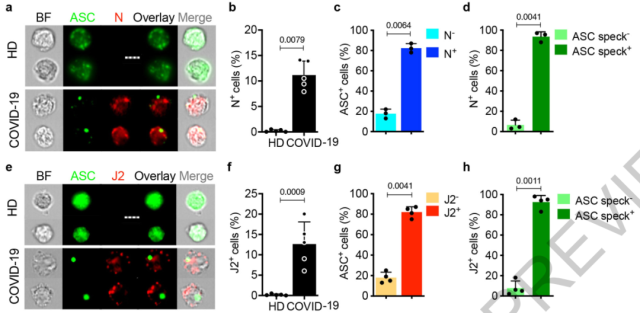New coronavirus infects immune cells with antibodies for the first time
- Normal Liver Cells Found to Promote Cancer Metastasis to the Liver
- Nearly 80% Complete Remission: Breakthrough in ADC Anti-Tumor Treatment
- Vaccination Against Common Diseases May Prevent Dementia!
- New Alzheimer’s Disease (AD) Diagnosis and Staging Criteria
- Breakthrough in Alzheimer’s Disease: New Nasal Spray Halts Cognitive Decline by Targeting Toxic Protein
- Can the Tap Water at the Paris Olympics be Drunk Directly?
- Should China be held legally responsible for the US’s $18 trillion COVID losses?
- CT Radiation Exposure Linked to Blood Cancer in Children and Adolescents
- FDA has mandated a top-level black box warning for all marketed CAR-T therapies
- Can people with high blood pressure eat peanuts?
- What is the difference between dopamine and dobutamine?
- How long can the patient live after heart stent surgery?
“Nature”: New coronavirus infects immune cells with antibodies for the first time. Scientists have found that the new coronavirus can infect monocytes through antibodies, or is the key to the inflammatory response of COVID-19 pneumonia.
This week Nature contributed a thought-provoking paper, yes, that’s what we’re going to talk about next. Scientists at Boston Children’s Hospital in Massachusetts found that the new coronavirus can infect immune cells, not through the familiar ACE2 receptor, but through the Fcγ receptor with the help of antibodies [1].
A large number of cytokines released by infected monocytes and macrophages may be the trigger that triggers the large-scale inflammatory response in severe patients with COVID-19 pneumonia; at the same time, the role of antibodies in it also reminds us that the therapeutic antibodies currently under development have There is a certain risk of becoming a potential accomplice of inflammation .

Large-scale inflammation can be said to be the initiator of a series of organ damage caused by COVID-19 pneumonia. Since the beginning of the epidemic, scientists have been exploring what triggers the inflammation.
The researchers first tried to examine the plasma of patients with COVID-19 pneumonia and found that about 6% of monocytes were in a state of pyroptosis, a type of cell death associated with inflammation . Normally dead cells are cleared very quickly, so it is definitely not normal to see so many dead cells at the same time.
Compared with the plasma of healthy people, the levels of all pyroptosis-related biomarkers in the plasma of the COVID-19 patients were significantly higher, and within the patients, the severe patients were particularly prominent .
 COVID-19 patients have higher levels of pyroptosis markers and inflammatory cytokines
COVID-19 patients have higher levels of pyroptosis markers and inflammatory cytokines
Severely ill patients are relatively mildly ill
These data suggest that pyroptosis-induced monocyte death and subsequent release of proinflammatory cytokines is likely a cause of poor prognosis .
In addition, the researchers also found a confusing phenomenon, the presence of the new coronavirus nucleocapsid in many monocytes, and these monocytes without exception express a surface receptor CD16 , which is the Fc that binds antibodies. FcγRIIIa of the receptor family, which is mainly involved in antibody-dependent phagocytosis (ADCP).

CD16 co-localizes with nucleocapsid staining (N)
So, what exactly makes monocytes “inflamed” and even die of pyroptosis?
Pathogen infection is a major cause of inflammation. There have been few studies before that monocytes and macrophages can be infected by the new coronavirus , and researchers have also detected the “relics” of the new coronavirus in monocytes. One can’t help but speculate that monocytes may be infected by the new coronavirus.
But the biggest problem is that ACE2, the gate of the new coronavirus entering cells, is not expressed in monocytes .
In fact, there is another trick for viruses to invade cells, which is to catch the “ride” of antibodies. The virus opsonized by antibodies will be recognized by Fc receptors and actively swallowed by cells under ADCP [2]. This also coincides with the previous findings.
The researchers also carried out further confirmation and found signs of viral replication in monocytes. Overall, viral nucleocapsids or double-stranded RNA were found in about 10% of monocytes, of which 95% had viral replication; almost all infected cells showed markers of pyroptosis, while all Pyroptotic cells are all infected cells .

Nucleocapsid (N), pyroptosis marker ASC plaque, replication marker J2
Then we can say with certainty that the pyroptosis of monocytes is caused by the infection of the new coronavirus .
This phenomenon was also observed in the resident macrophages in the lung tissue of the deceased with COVID-19 pneumonia, and only macrophages showed pyroptosis and inflammatory activation, and the infected lung epithelial cells and endothelial cells did not have similar phenomena .
At the same time, it is not difficult for us to determine that CD16 is the key mediator .
In fact, blocking CD64 (FcγRI) can also prevent inflammation and pyroptosis in the experiment, but because CD16 and CD64 have similar mechanisms, researchers believe that CD16 plays a major role.
In the face of the new coronavirus, even the immune cells are lost, which seems serious, but it is not all bad.
Although it was detected in the experiment that the new coronavirus in the monocytes has begun to replicate, it does not actually produce a contagious virus , which means that the inflammation and pyroptosis of the monocytes actually die together with the new coronavirus.
Blocking the reproduction and spread of the virus in the body may actually be a good thing .
The last question is, which antibodies will be used by the new coronavirus?
Interestingly, in the experiment, the naturally produced antibodies from people infected with the COVID-19 virus will open the door for the COVID-19 virus to infect monocytes, but the antibodies from people who have been vaccinated with mRNA have no such effect .
From the experimental details, we can see some clues:
① IgG against S protein can mediate new coronavirus infection , but even if the anti-RBD IgG level of vaccinees is twice that of patients, it cannot promote virus entry or replication;
② urgent The Fc segment of the antibody in severe COVID-19 patients will have obvious afucosylated modification (afucosylated), which helps to bind to CD16 [3], and the low afucosylated IgG is the same as the IgG from healthy people. Does not promote infection .
 Left: Antibodies produced after vaccination do not promote infection
Left: Antibodies produced after vaccination do not promote infection
Right: Low afucose modified antibodies do not promote infection
It can be seen that whether it will be used by the virus depends on the structure of the antibody, so don’t think too much about it. There may be potential dangerous molecules in the various therapeutic antibodies currently being developed – of course, this must be left to the follow-up. experiments to explore.
This paper is the first to find that the infection of monocytes by the new coronavirus is mediated by antibodies, and the experimental content and another paper recently published on the preprint [4] also corroborate each other.
Fortunately, the antibodies produced by the vaccine seem to be very safe at present, and everyone must be vaccinated!

References:
[1]Junqueira, C., Crespo, Â., Ranjbar, S. et al. FcγR-mediated SARS-CoV-2 infection of monocytes activates inflammation. Nature (2022). https://doi.org/10.1038/s41586-022-04702-4
[2]Bournazos, S., Gupta, A. & Ravetch, J. V. The role of IgG Fc receptors in antibody-dependent enhancement. Nat Rev Immunol 20, 633–643, https://doi.org/10.1038/s41577-020-00410-0 (2020).
[3]Larsen, M. D. et al. Afucosylated IgG characterizes enveloped viral responses and correlates with COVID-19 severity. Science 371, eabc8378, https://doi.org/10.1126/science.abc8378 (2021).
[4]https://www.biorxiv.org/content/10.1101/2021.09.27.461948v2
New coronavirus infects immune cells with antibodies for the first time
(source:internet, reference only)
Disclaimer of medicaltrend.org
Important Note: The information provided is for informational purposes only and should not be considered as medical advice.



